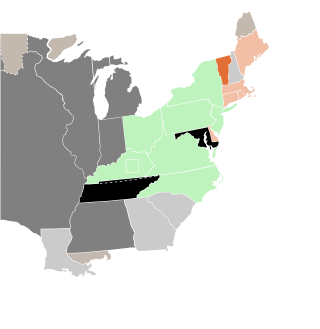
The 14th United States Congress was a meeting of the legislative branch of the United States federal government, consisting of the United States Senate and the United States House of Representatives. It met in the Old Brick Capitol in Washington, D.C. from March 4, 1815, to March 4, 1817, during the seventh and eighth years of James Madison's presidency. The apportionment of seats in the House of Representatives was based on the 1810 United States census. Both chambers had a Democratic-Republican majority.
The 1816–17 United States House of Representatives elections were held on various dates in various states between April 30, 1816 and August 14, 1817. Each state set its own date for its elections to the House of Representatives before the first session of the 15th United States Congress convened on December 1, 1817. The size of the House increased to 184 after Indiana and Mississippi achieved statehood.
The 1814–15 United States House of Representatives elections were held on various dates in various states between April 26, 1814, and August 10, 1815. Each state set its own date for its elections to the House of Representatives before the first session of the 14th United States Congress convened on December 4, 1815. They occurred during President James Madison's second term. Elections were held for all 182 seats, representing 18 states.

The 1812–13 United States House of Representatives elections were held on various dates in various states between August 3, 1812, and April 30, 1813. Each state set its own date for its elections to the House of Representatives before the first session of the 13th United States Congress convened on May 24, 1813. They coincided with James Madison being re-elected president.

The 1814–15 United States Senate elections were held on various dates in various states. As these U.S. Senate elections were prior to the ratification of the Seventeenth Amendment in 1913, senators were chosen by state legislatures. Senators were elected over a wide range of time throughout 1814 and 1815, and a seat may have been filled months late or remained vacant due to legislative deadlock. In these elections, terms were up for the senators in Class 1.

The 1808 United States House of Representatives elections in New York were held from April 26 to 28, 1808, to elect 17 U.S. Representatives to represent the State of New York in the United States House of Representatives of the 11th United States Congress. At the same time, a vacancy was filled in the 10th United States Congress.

The 1814 United States House of Representatives elections in New York were held from April 26 to 28, 1814, to elect 27 U.S. Representatives to represent the State of New York in the United States House of Representatives of the 14th United States Congress.

The 1816 United States House of Representatives elections in New York were held from April 23 to 25, 1816, to elect 27 U.S. Representatives to represent the State of New York in the United States House of Representatives of the 15th United States Congress. At the same time, a vacancy was filled in the 14th United States Congress.

The 1822 United States House of Representatives elections in New York were held from November 4 to 6, 1822, to elect 34 U.S. Representatives to represent the State of New York in the United States House of Representatives of the 18th United States Congress.

Pennsylvania held its elections October 11, 1814.
Massachusetts held its elections November 7, 1814. State law required a majority vote for election, which was not met in two districts, leading to a second election January 6, 1815.

On August 2, 1813, Representative John Gloninger (F) of Pennsylvania's 3rd district resigned his seat. A special election to fill this vacancy was held on October 12, 1813. This was the first of two special elections held in the 3rd district in the 13th Congress.

On May 16, 1815, Representative-Elect Jonathan Williams (DR) who'd been elected for Pennsylvania's 1st district, died before the start of the 14th Congress. A special election was held on October 10 of that year to fill the vacancy left by his death.

On July 2, 1815, Representative-elect Amos Ellmaker (DR) of Pennsylvania's 3rd district resigned after being appointed and commissioned president judge of the Twelfth Judicial District of Pennsylvania, composed of the counties of Dauphin, Lebanon, and Schuylkill, and before the 14th Congress' first session began. A special election was held on October 10, 1815, to fill the vacancy left by his resignation.

On March 12, 1815, a few days after the legal start of the 14th Congress, but long before the first meeting of that Congress, David Bard (DR), who'd been re-elected to the 9th district, died. A special election was held on October 10 to fill the vacancy left by his death.

On October 6, 1814, prior to the beginning of the Fourteenth Congress, Representative-elect Benjamin Pond (DR), who'd been elected to New York's 12th district, died. A special election to fill this vacancy was held in April, 1815.

The 1816 special elections for Maryland's 5th congressional district were to fill two separate vacancies. The 5th district was a plural district, with two seats. Both seats were vacated, the first by Representative Nicholas R. Moore (DR) in 1815, before the 14th Congress even met, and the second by Rep. William Pinkney (DR) on April 18, 1816, after being named Minister to Russia.

On May 27, 1815, Representative Matthew Clay (DR) of Virginia's 15th district died in office before the start of the 1st session of the 14th Congress. A special election was held in October of that year to fill the resulting vacancy.

Kentucky held its elections August 3, 1814.
Although elected in the 1814–1815 United States House of Representatives elections in Massachusetts, Daniel A. White (Federalist) of the 3rd district was offered, and accepted, the position of probate judge in Essex County before taking his seat in Congress.









